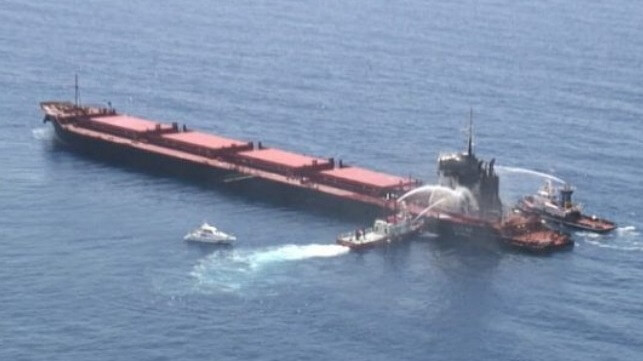Calls for Oversight as More Ships Fail Inspections as Fire Risks Increase

The dangers of fire at sea persist and are growing as new cargoes including lithium-ion batteries, and alternative fuels, begin to become more prevalent. Survival Technology provider Survitec is highlighting the results of a new analysis that shows an “alarming increase” in fire-safety-related deficiencies found during Port State Control Inspections and subsequent ship detentions while calling for better oversight.
Despite fire continuing to be a leading cause of major shipping incidents, accounting for over 20 percent of total losses, and the most expensive cause of marine insurance claims, Survitec highlights the increase in failed inspections and detentions. The Paris MoU in 2022 recorded the highest level of fire safety deficiencies in a decade. Similarly, the Tokyo MoU also reported an increase in detentions, with a staggering 15,562 deficiencies reported in 2023, often involving fire safety concerns. Similar concerns have been voiced by both the U.S. Coast Guard and insurer Allianz which cited a dramatic increase in the number of fires at sea.
“Analysts report a 17 percent year-on-year rise in shipboard fires, which correlates with an increasing number of reports and testimonies from our network of certified service technicians and engineers that document serious faults requiring immediate corrective measures,” says Metkel Yohannes, Director of Service & Rental Solutions at Survitec.
Among the issues they point to are the impact of the economic downturn and the emphasis on cost reduction post-COVID which they believe have negatively impacted fire safety. Survitec reports that some shipowners and operators are maintaining and inspecting safety equipment themselves in an attempt to save costs.
Among the examples they cite is a fire on a bulk carrier. The vessel had completed a fire safety inspection and received full certification from a local service provider. However, shortly after leaving port, a fire broke out in the engine room. Over half of the cylinders failed to activate despite the CO2 system having been inspected and approved. While the fire was eventually extinguished, it caused significant damage to the vessel, resulting in off-hire and repair costs estimated between $2-3 million.
“We’re finding basic errors and oversights that do not become apparent until either the ship fails an inspection and is detained – or there is a fire,” says Yohannes.
In another example, they report the company was called in for an inspection only after a ship had suffered an engine room fire. The crew had managed to extinguish the fire but suspected there was a fault with their high-expansion foam firefighting system. The inspectors probing the system discovered the crew had installed a new foam pump and forgotten to remove one of the protective caps from the inlet.
“We see evidence of a slip in standards regarding basic safety practices but also a wide disparity in service quality between service providers,” says Yohannes. “Approval stamps are being applied to fire systems and appliances that would or should not pass inspection. Some issues are self-evident; for example, rust on a valve or fire extinguisher is clear to see, but other issues are less obvious and can have catastrophic consequences.”

that matters most
Get the latest maritime news delivered to your inbox daily.
For example, in CO2 firefighting systems, hydraulic hoses are often mistaken for high-pressure hoses but they are not designed for CO2 applications and may burst under pressure.
Survitec is calling for a review of current practice and as an industry to determine if more oversight, governance, and quality control procedures are required.
